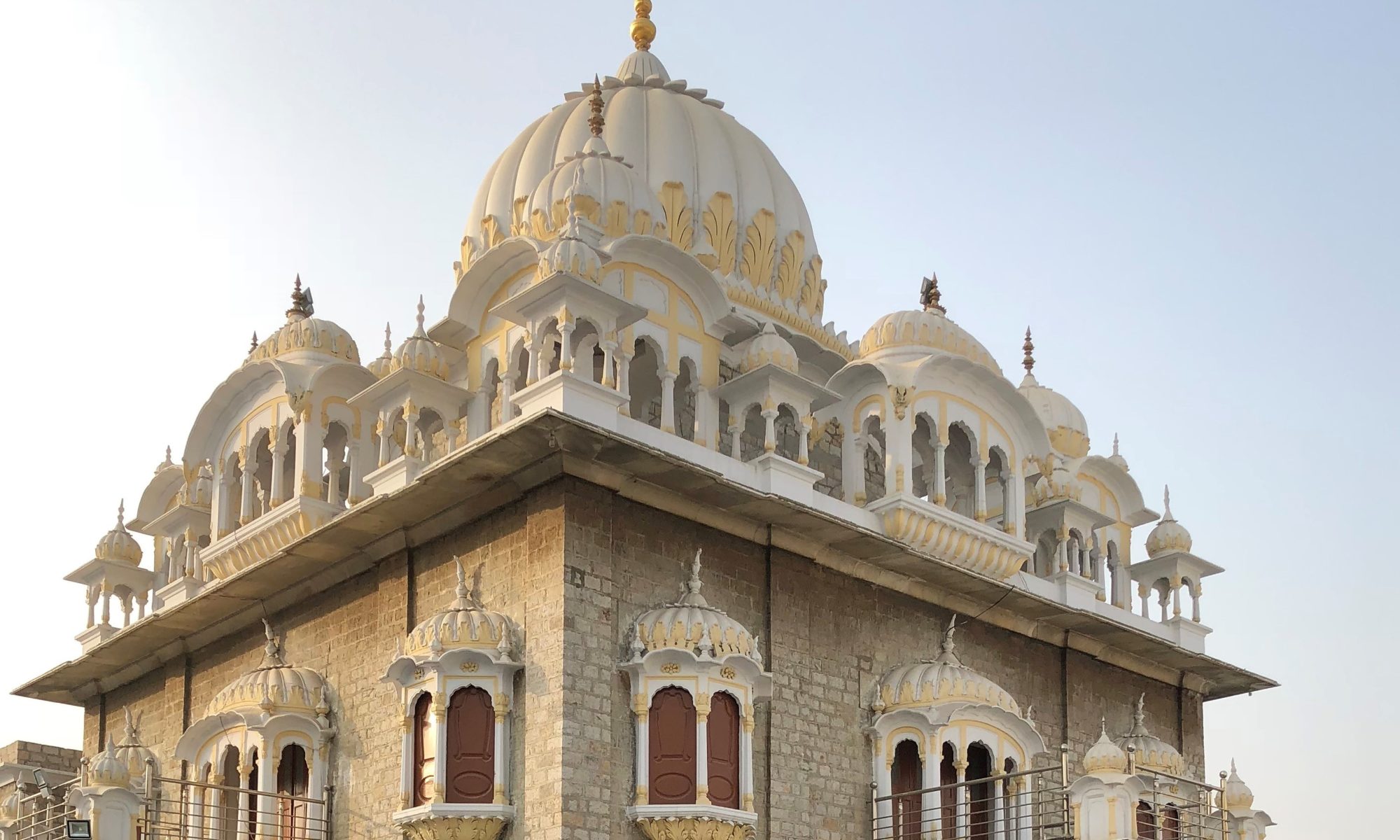Guru Nanak was the first Guru of the Sikhs. Yet to say that he was put here on earth to serve the cause of a select group of people is a misrepresentation of the facts. He was a humble servant of God whose mission was to put forth a message for all humanity …and for all time. Born into a Hindu family in 1469, Guru Nanak cared little for outward, divisive labels: Na koi Hindu, Na koi Mussulman (There are neither Hindus nor Muslims). All human beings regardless of race, religion or gender are equal in the eyes of God.
Guru Nanak preached that the inner temple of the heart was the greatest monument to one’s faith in God: Sunia mannia man kita bhao. Antar-gat tirath mal nao. Hearing, believing and loving the Name of God is like bathing in the true shrine that exists in one’s self (Jap Ji). In this way he gave people the strength to walk away from centuries of subservience to the elite priestly class that claimed that one was either born with God’s grace or without. He emphatically rejected the caste system and all its injustices. As well, he freed people from enslavement to meaningless and wasteful rituals by speaking the languages of logic and love.
He won the hearts and minds of the common folk with sweetness and warmth. But to turn people 180 degrees around from their backward descent at the hands of the Establishment and undeserving authority, Guru Nanak knew that he would also have to instill great courage in the laymen. In Gurbani he states: If you are fond of playing the game of love, enter my path with head in hand. Once you set your foot upon it, lay down your head without any fear or hesitation (Aad Granth 1412). His revolution in essence awoke people from years of sleepwalking and opened their eyes to the inequality and harmful reality that surrounded them: He who acts blindly is truly blind. His heart does neither see nor realize the folly of what he does (AG 1289).
Guru Nanak strove to create an environment of rationality and open and free discussion: As long as we are in this world, Nanak, we should hear somewhat and speak somewhat of the Lord (AG 661). Listening to Gurbani without understanding its profound implications and practical applications is like holding a sumptuous peach without tasting its sweetness. The peach retains its intrinsic beauty but we deny ourselves the rewards and benefits of its flavour and nutrients.
Also, Guru Nanak harboured no religious enmity. However, he strongly denounced religious hypocrisy. Indeed, the true Muslim or Hindu was dearer to his heart than the false Sikh. Two of his earliest disciples were in fact Mardana, a Muslim who accompanied Guru Ji on his many travels, and Bala, a Hindu peasant. Even at the end of his own physical time, Hindus and Muslims wondered whether Guru Ji should be cremated or buried: Guru Nanak Shah Fakeer/ Hindu ka Guru, Mussulman ka Peer. Such was the immense impact of his teachings and the devotion he inspired in all.
Guru Nanak’s basic philosophy can be summed up by the Three Golden Rules: 1) Naam Japna; 2) Wand Chhakna; and 3) Dharam di Kirat Karni. First, remember God’s Name in every single endeavour you undertake. Second, share your earnings with others, especially with those less fortunate than yourself. And third, earn your livelihood through hard work and by honest means. As is evident from these core tenets it is one’s deeds and conduct that Guru Nanak places on a pedestal above all else. Guru Nanak says, Truth is the highest virtue but higher still is truthful living (AG 62). As such he advocated active participation in the daily affairs of one’s community. Guru Ji himself was a householder and denounced the ascetic lifestyle. He knew that true morality could only be gauged in terms of one’s interaction with one’s neighbours and that those who sought to run away from the world’s problems were not immoral but, rather, amoral.
530 years after the birth of Sri Guru Nanak Dev Ji, we the Sikh youth prepare to carry the torch into the new millennium. But, today, there are those among us who would prefer that we divide our faith and go down different paths with different torches. However, such a course of action is blatantly not in accordance with Guru Nanak’s teachings: Nanak, deem that such is the true Guru who UNITES ALL with the Lord (AG 72). Guru Ji preached that God lives in each and every one of us (AG 433). Therefore, achieving union with the Almighty Lord necessitates that we must first come together as brothers and sisters. In this regard it is the youth that must take the reigns and, with the infallible guidance of holy Gurbani, steer us clear of ritualism, hypocrisy, and fragmentation – the very dangers that Guru Nanak sought to eradicate five centuries ago.
Harmohanjit Singh Pandher
Burnaby, B.C. Canada
